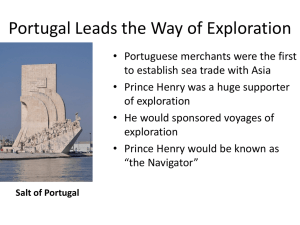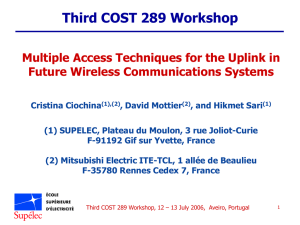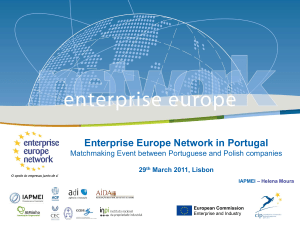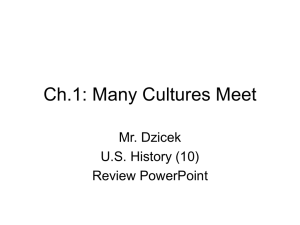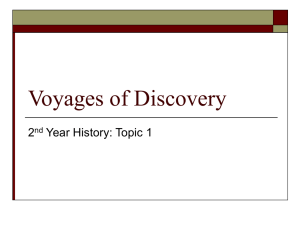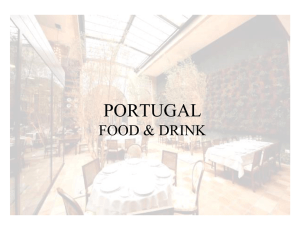4 SPIC - Umed.wroc.pl
advertisement
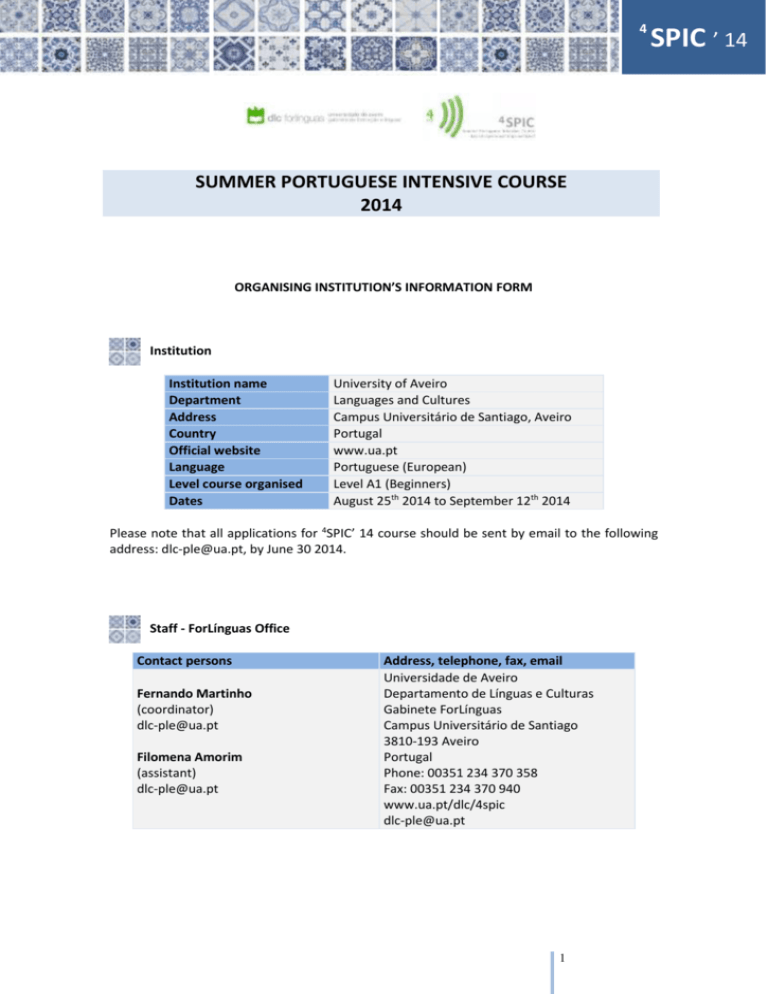
4 SPIC ’ 14 SUMMER PORTUGUESE INTENSIVE COURSE 2014 ORGANISING INSTITUTION’S INFORMATION FORM Institution Institution name Department Address Country Official website Language Level course organised Dates University of Aveiro Languages and Cultures Campus Universitário de Santiago, Aveiro Portugal www.ua.pt Portuguese (European) Level A1 (Beginners) August 25th 2014 to September 12th 2014 Please note that all applications for 4SPIC’ 14 course should be sent by email to the following address: dlc-ple@ua.pt, by June 30 2014. Staff - ForLínguas Office Contact persons Fernando Martinho (coordinator) dlc-ple@ua.pt Filomena Amorim (assistant) dlc-ple@ua.pt Address, telephone, fax, email Universidade de Aveiro Departamento de Línguas e Culturas Gabinete ForLínguas Campus Universitário de Santiago 3810-193 Aveiro Portugal Phone: 00351 234 370 358 Fax: 00351 234 370 940 www.ua.pt/dlc/4spic dlc-ple@ua.pt 1 4 SPIC ’ 14 Part I: General information 1. Description of the town Short history and location Aveiro is located 250 km north of Lisbon and 10 km from the Atlantic coastline. It is a lively city and the hub of an important business region. The main feature of the surrounding area is the extensive delta lagoon (“Ria”), which occupies an 11,000-hectare area between the land and the ocean. With a population of around 70,000, the city is not a sprawling metropolis. It has excellent city transport systems (including a free bike-use scheme). The city centre has been carefully planned to blend in with its natural surroundings, with the beauty of the region reflected in its streets, shopping centres and parks. Aveiro offers a wide choice of entertainment, including bars, restaurants, nightclubs, cinemas, a theatre and concerts and, of course, there are the lively Portuguese cafés. If you are looking for history and art, Aveiro has museums, churches, monuments and public buildings of architectural importance and the town is very popular for its gastronomy, fairs and exhibitions. Main local, cultural and other events/activities Aveiro offers a considerable range of cultural activities for a city of its size. The city’s stages host plays put on by both national and local companies, including GRETUA – the University of Aveiro’s experimental performance group. Concerts and dance shows are regularly held in Aveiro, too. Fans of the “7th art” have a choice of two mainstream seven-screen cinema complexes in town. For those who prefer alternative cinema, there is one screen showing independent (mainly European). You can also catch a film at the youth centre or the cultural centre. The museums and art galleries in the city offer exhibitions of painting, sculpture and photography, amongst other art forms. The University of Aveiro plays a significant role in the cultural life of the city and is a major driver of cultural development. Lying in a tourism area known as Rota da Luz, Aveiro also offers a broad range of summer activities that are centred on its beaches – Praia da Barra and Praia da Costa Nova. There are plentiful opportunities for surfing, windsurfing, body boarding, sailing and other water sports. Visitors can take part in numerous regional events and festivals, many with populist, religious or even pagan overtones. There are also walking and biking routes, along which you can discover the flora and fauna of the area of Aveiro and paintball, bowling, carting, etc. 2 4 SPIC ’ 14 How to reach the town (links from the nearest airport, train or coach stations) By plane – the two closest international airports are Sá Carneiro (Porto) and Portela (Lisbon). The first of these is about one hour from Aveiro while the second is about two and a half hours away (by car or train, in both cases). By car – to reach Aveiro by car, take the A1 motorway if you are coming from the north and exit at “Aveiro Norte”. Then take the A25 motorway to Aveiro. If coming from the south, use the A1 motorway, take the “Aveiro Sul” exit and from there follow the N235 national route. If you bring your car into Portugal, you will need to obtain an electronic toll payment device, in order to travel on Portuguese toll roads legally. For more information, please see: http:/ / www.aveiro.eu/uploads/fl_83.pdf. By train – Aveiro is located on the main north-south railway, linking Portugal and Spain. There is good access to Aveiro from northern European countries too. The railway station is in the centre of the city. By foot, the University is some 15 minutes away. You can also get to the campus by taxi, bus or a bicycle. Transport in town (brief information on the main means of transport available) The integrated city bus network is run by the TRANSDEV company. There are also two minibus routes between the railway station and the university campus, with departures every ten minutes. A “BUGA” is a bike that can be borrowed on a casual basis for getting around Aveiro town centre. There are bike parks situated throughout the town and the university campus. Taxis can be called by phone, taken at taxi ranks or on flagged down. Most taxis are beige and display the letter “A” on the door. Fares vary from district to district, but generally speaking taxis are not as expensive in Portugal as in most other European countries. The fare is based on the distance travelled, with extra charges for luggage. It is not necessary to tip the driver. 2. Short description of the organising institution University of Aveiro The University of Aveiro (UA) is a public institution with a mission to provide and develop graduate education, research and cooperation with society. Founded in 1973, it quickly became one of the most dynamic and innovative universities in the country. The University of Aveiro has always positioned itself at the forefront of innovation. It does this in two main ways, the first of which is the provision of degree programmes in advanced scientific and technological areas and the development of modern infrastructures and sophisticated equipment. It also invests in the training and recruiting of teachers and researchers with proven track records in the development of research projects and in building close relations with the worlds of business and industry. Today, the UA is a key partner for many companies, providing services, know-how and highly qualified graduates. It participates in numerous research projects in the development of new products. The excellence of its research is the trademark of this institution, with 70% of its research units having been classified as “very good” and “excellent” in recent external evaluations. Web: http://www.ua.pt http://www.ua.pt/ensino/ http://www.ua.pt/default.aspx 3 4 SPIC ’ 14 3. Accommodation Short description of the accommodation offered (hotel, apartments, student halls, others; if there are cooking facilities) and of the rent to be paid per week Selected participants registered with modality course + accommodation will be housed in UA halls of residence, in individual rooms with access to a shared kitchen and common living room. On arrival, course participants will be provided with sheets, duvets and towels. The sheets and towels will be changed weekly and common areas (kitchen, bathroom and living room) are cleaned daily. The kitchen is equipped with a fridge, stove and microwave, but does not have kitchen utensils. Halls of residence are located within short and easy walking distance from the Department of Languages and Cultures. The price of accommodation, for 21 days (from August 24th to September 14th), is included in the fee. 4. Meals Short description of the services offered (university canteens, restaurants, bars, others) On Campus, meals can be taken at any of the university canteens. These are open for lunch and dinner every day of the week (including weekends). The basic price is € 2.45 for soup, bread, a main course and a piece of fruit. Payment is in the form of meal tickets, which can be purchased from vending machines at various points around the campus. If you have any dietary restrictions, you may like to consult the weekly menus on the website (http://www.ua.pt/sas/) or the list at the entrance to the canteen entrance. Vegetarian dishes are always available at the self-service canteen, located next to the residential complex. There are also a number of bars on Campus, serving breakfast, coffee and snacks, on weekdays, between 8.30 am and 5.30 pm. The universityowned bars are subsidised, while others on campus are privately owned and are not subsidised. 5. Reception of students Meeting point (place, date and time of first meeting) Participants will be welcomed at the Department of Languages and Cultures on August 25th 2014, at 9 am, with an opening session and coffee break. The aim of the session is for us to get to know the participants and for you to meet each other, the course organisers, the teaching team and the technical support team. On the night of the August 25th 2014, the Erasmus Student Network (ESN) will organise a reception for the participants, thus providing a first contact with Portuguese students and with the city of Aveiro. 4 4 SPIC ’ 14 6. Extramural activities Sports facilities (swimming, tennis, gymnasium; opening days and available information) The University of Aveiro’s social services unit promotes and regulates sporting activities that meet the needs of the university community. In addition to the management of the university’s sports facilities, the unit cooperates in the organisation and management of sporting activities for the university community. It also works with the student union (AAUAV) and establishes cooperation agreements with exterior entities. You must provide a medical certificate of fitness or sign a declaration of responsibility if you want to use the university’s sports or athletics facilities. You will need an ID card when filling out the declaration of responsibility. An ACD (meaning cultural activities and sports) is a joint project between the social services unit, the student union and the university’s administrative body. It aims to encourage students to take part in informal sports activities. Once set up, the various ACD grew rapidly and have helped to establish a tradition of informal sports at the university. There are many activities and events on offer. Students can participate whenever they want, without the need to make a major commitment, upon payment of a symbolic fee each semester. The following activities are available to students: aikido, athletics, badminton, baseball, basketball, capoeira, riding, futsal, gymnastics, haidong gumdo, karate, bodybuilding, swimming, rugby, squash, taekwondo, tennis, table tennis, archery, tai chi qigong, volleyball, chess, yoga. For those wishing to engage competitively, there are the following: handball, athletics, badminton, baseball, basketball, football, futsal, roller hockey, swimming, rugby, squash, taekwondo, tennis, table tennis, volleyball, chess. Schedules: Sports pavilion Every day from the 9 am to 1 am Reception Monday to Thursday from 12 am to 10 pm Fridays from 12 am to 8 pm Athletics track Monday to Friday from the 9 am to 12 pm Physical training room (bodybuilding) Monday to Friday from 11 am to 2 pm Monday, Wednesday and Friday from 5 pm to 9 pm Tuesday and Thursday from 4 pm to 8 pm Sauna schedule Monday to Friday from 10 am to 12 pm 5 4 SPIC ’ 14 Squash schedule Monday to Friday from 9 am to 12 pm See the price list at: https://www.ua.pt/ReadObject.aspx?obj=30967 For further information please see: http://www.ua.pt/sas/PageText.aspx?id=11619 Entertainment (cinema, theatre, etc; brief information on places and student facilities) There are two large multi-screen cinemas in Aveiro offering reduced rates through your UA International Student Card (Lusomundo: Forum and Glicínias), each within 10 minutes walking distance from the university campus. In town, there are also two other screens showing non-mainstream films (Cineclube de Aveiro). There are many other types of cultural activity waiting to be found in Aveiro. The city has a number of performance spaces, with a regular offer of music festivals and theatrical productions, as well as conferences (Teatro Aveirense, GRETUA, CETA and Efémero). In addition, there are two cultural centres that organise various activities (plays, shows, concerts, lectures, etc.): the Aveiro City Theatre (Teatro Aveirense) and the Cultural and Congress Centre of Aveiro – the former Jerónimo Campos Pereira ceramics factory. There are also other cultural centres in neighbouring areas (such as Ílhavo or Estarreja) that also organise international programmes. In addition, the 15 museums in the area recount and recall the history and bygone civilisations of Aveiro and the surrounding district. There are exhibitions of local crafts, costumes, machinery, ceramics, life at sea and popular traditions. These museums include Museu de Santa Joana Princesa, Museu Arte Nova, Museu da Cidade, Museu Marítimo de Ílhavo, etc. In general, museums are open daily (except Mondays). 6 4 SPIC ’ 14 Part II: 4SPIC course description 1. Portuguese as a Foreign Language Level (CEFR) Level A1 – Beginners level 2. Period From To th August 25 2014 September 12th 2014 3. Short description of language component Course The beginner’s course in Portuguese (A1) aims to develop simple communication skills in diverse situational contexts, such as social contacts, personal and interpersonal introductions, basic contextual information and everyday communication. Emphasis will be given to cooperative oral and written work, with the support of information and communication technology and, more specifically, of the multimedia laboratory. The language and cultural knowledge acquired in class will be presented through guided discovery and consolidation activities focused on the reality of Aveiro. Students will have the opportunity to socialise with local people, read real texts written in Portuguese and will get to know some of the specific habits and customs of Aveiro and/or the Portuguese people in general. However, because the course will be functioning at the same time, students may also mix with colleagues from the other courses, so they can benefit peer input. At the end of the course, students should be capable of communicating and understanding information of a general nature in Portuguese and should also feel motivated to continue learning this language during their academic course in Portugal or/and during their professional life. During the course, the mornings will usually be dedicated to face-to-face tuition (in a classroom or in a multimedia laboratory). Afternoon activities will consist of tours, exhibitions, etc. 4. Short description of the cultural elements included in the course Cultural component The non-teaching activities taking place during the courses are designed to allow students to experience the material and immaterial heritage of the city of Aveiro and its region. The first week will be dedicated to art, history, culture and local architecture. We will start with a boat ride by Moliceiro, along Aveiro’s canals, followed by visits to the Museum of Aveiro, the Cathedral, the Troncalhada Ecomuseum and the saltpans. A walking tour of Aveiro will take the city’s Art Nouveau architecture, the decorated cobble sidewalks and 7 4 SPIC ’ 14 characteristic Portuguese tiles and municipal and regional architecture, both ancient and modern. The second week of the course will continue with an exploration of our nautical and fishing history. There will be a visit to the Santo André Boat Museum, the Maritime Museum of Ílhavo and its Cod Aquarium. The third week will focus on other features of industrial and tourist interest in the region, with visits to companies like PT Inovação and the Ceramics Factory of Vista Alegre, in Ílhavo. This last visit will also serve to illustrate the types of (manufacturing and construction) materials that are commonly used in the region. During the courses, students will also be invited to participate in the seasonal festive activities organised by the city of Aveiro and adjoining municipalities. The course aims to provide the across-the-board training in Portuguese that students will need to facilitate their work in their respective areas of study or work. We consider that the knowledge shared through the cultural and social component of this course will contribute to opening up new horizons and opportunities for students coming to the University of Aveiro to study, as well for working participants. 5. Assessment methods Assessment Students will be comprehensively assessed on their written competences (reading comprehension and writing), oral competences (understanding and oral expression) and knowledge of language structure. A set of exercises and activities will be administered along the course, as a way of checking if the requisite skills have been acquired. Students will also be tested at the end of the course. This final exam will measure knowledge, skills and abilities. Teachers will set the dates for the different evaluation activities. 6. Methodology Language learning During the course, mornings will normally be spent in lessons (in the classroom or multimedia laboratory) and the afternoons will be given over to extracurricular activities (visits, shows, exhibitions, etc.). In the Portuguese lessons, we will use an expository method for transmitting and reinforcing information and essential content. The teacher will explain the concepts inductively and deductively to nurture both students’ attention and their motivation to carry out the tasks that represent the practical application of acquired knowledge. Students should be receptive, but not passive, and the teacher will engage the students in acquiring the knowledge and skills in a motivating manner. In the oral expression workshops, we will use the participatory method for conversation. Here, students play an active role during class, raising questions or discussing different themes that are of interest to them. The teachers act as mediator and facilitator. In the workshops on written production, we will be using the participatory expository method with students working independently or in groups, so they can practise their knowledge and respond actively to the challenges put to them. While they are carrying out their tasks, it will fall to the teachers to reply to issues raised and to answer students’ questions, in this way strengthening the information on the content. 8 4 SPIC ’ 14 Students will work more independently in the multimedia laboratory. The teachers will distribute autonomous tasks and then take on the role of supporter. Students will progress at their own pace and each student’s cognitive learning mechanisms will be respected, while they use the computer as a tool to help them solve problems or questions. We will use music, films and excerpts from television, podcasts and other content available on the internet. This methodology is meant to keep the students focused and alert as well as develop their ability to solve problems and test their capacity to apply knowledge. 7. Pedagogical and didactical approach, teaching methods to be used Learning process The Portuguese as a Foreign Language course will take a constructivist approach, in that the building up of each student’s knowledge base will take into account their cognitive structures and socio-historical background. Portuguese language and culture will be applied as a tool for addressing the culture of the student’s own country, their individual experience, their interests and their critical and reflective capabilities. This will allow the student to construct new knowledge by interacting with their surroundings and resolving problems. Thus, the student will be encouraged to develop a proactive approach to seeking knowledge, constructing know-how and developing competences. 8. Arrangements for providing participants with ECTS ECTS credits Erasmus+ students who successfully complete the course will be awarded 6 ECTS. Participants in 4SPIC will receive the ECTS Transcript of Records and an attendance certificate. The originating institution shall make the decision on how the credits are to be recognised (either through an internal accreditation process or through a supplement to the participant’s course diploma). 9. Learning outcomes Objectives By the end of the course, learners should develop productive and receptive written and spoken competences that will allow them to: 1. Understand and use familiar everyday expressions and simple announcements, allowing them to fulfil concrete communication needs. 2. Know how to communicate simply in various situational contexts, such as introducing oneself to others, asking and answering personal information questions. 3. Know how to use appropriate vocabulary and structures when communicating. 4. Practise and consolidate the basic structures in Portuguese. 5. Deal with tangible and intangible cultural topics pertinent to the Aveiro region. 6. Show openness and awareness of multiculturalism and multilingualism. 9 4 SPIC ’ 14 Part III: Work Program 1. Duration Hours in classroom Hours of cultural component Hours of complementary activities (opening and closing sessions) Total 60 22 8 90 1. Structure Total number of classes, contact hours, hours of practice conversation/language lab, etc. Total course hours 90 Portuguese Language 24 (12d x 2h) Introduction to Oral Expression 4 (4d x 1h) Introduction to Written Expression 4 (4d x 1h) Oral Expression Workshops 9 (9d x 1h) Written Expression Workshops 9 (9d x 1h) Multimedia Lab 10 ((3d x 2h)+(1d x 4h)) Cultural content 22 Complementary activities 8 Number of weeks 3 Days of classes 15 2. Schedule Classes and activities Week 1 09.00 – 11.00 – Students reception and coffee break Day 1 11.00 – 13.00 – Portuguese Language Aug., 25 Free afternoon 09.00 – 11.00 – Portuguese Language Week 1 Day 2 Aug., 26 11.00 – 12.00 – Introduction to Oral Expression 12.00 – 13.00 – Introduction to Written Expression 14.00 – 18.00 – Cultural activities: (a) walk in Aveiro: examples of Art Nouveau, the decorated cobble sidewalks and characteristic Portuguese tiles, municipal and regional architecture, both ancient and modern; (b) boat ride by Moliceiro on the Ria canal of Aveiro; (c) visit the Troncalhada Ecomuseum and the saltpans. Week 1 Day 3 Aug., 27 Week 1 Day 4 09.00 – 11.00 – Portuguese Language 11.00 – 12.00 – Introduction to Oral Expression 12.00 – 13.00 – Introduction to Written Expression Free afternoon 09.00 – 11.00 – Portuguese Language 11.00 – 12.00 – Introduction to Oral Expression 10 4 Aug., 28 Week 1 Day 5 Aug., 29 Week 2 Day 6 Sep., 1 12.00 – 13.00 – Introduction to Written Expression 14.00 – 18.00 – Cultural activities: (a) visit the Museum of Aveiro; (b) visit the cathedral. 09.00 – 11.00 – Free afternoon 09.00 – 11.00 – Week 2 Day 8 Sep., 3 Week 2 Day 9 Sep., 4 Week 2 Day 10 Sep., 5 Week 3 Day 11 Sep., 8 Week 3 Day 12 Sep., 9 Week 3 Day 13 Sep., 10 Week 3 Day 14 Sep., 11 Week 3 Day 15 Sep., 12 Portuguese Language 11.00 – 12.00 – Oral Expression Workshop 12.00 – 13.00 – Written Expression Workshop Free afternoon 09.00 – 11.00 – Week 2 Day 7 Sep., 2 Multimedia Lab 11.00 – 12.00 – Introduction to Oral Expression 12.00 – 13.00 – Introduction to Written Expression Portuguese Language 11.00 – 12.00 – Oral Expression Workshop 12.00 – 13.00 – Written Expression Workshop 14.00 – 20.00 – Cultural activities: (a) visit the Maritime Museum of Ílhavo and its Codfish Aquarium; (b) visit the Santo André Boat Museum. 09.00 – 11.00 – Portuguese Language 11.00 – 12.00 – Oral Expression Workshop 12.00 – 13.00 – Written Expression Workshop 14.00 – 18.00 – Multimedia Lab 09.00 – 11.00 – Portuguese Language 11.00 – 12.00 – Oral Expression Workshop 12.00 – 13.00 – Written Expression Workshop Free afternoon 09.00 – 11.00 – Multimedia Lab 11.00 – 12.00 – Oral Expression Workshop 12.00 – 13.00 – Written Expression Workshop Free afternoon 09.00 – 11.00 – Portuguese Language 11.00 – 12.00 – Oral Expression Workshop 12.00 – 13.00 – Written Expression Workshop Free afternoon 09.00 – 11.00 – Portuguese Language 11.00 – 12.00 – Oral Expression Workshop 12.00 – 13.00 – Written Expression Workshop 14.00 – 18.00 – Cultural activities: (a) visit 09.00 – 11.00 – Vista Alegre factory, in Ílhavo. Portuguese Language 11.00 – 12.00 – Oral Expression Workshop 12.00 – 13.00 – Written Expression Workshop Free afternoon 09.00 – 11.00 – Portuguese Language 11.00 – 12.00 – Oral Expression Workshop 12.00 – 13.00 – Written Expression Workshop 14.00 – 18.00 – Cultural activities: (a) visit 09.00 – 11.00 – PT Inovação. Multimedia Lab 11.00 – 13.00 – Closing session with presentation of diplomas 19.00 – 23.00 – Closing dinner 11 SPIC ’ 14 4 3. Contents Grammatical contents - Affirmative, interrogative and negative sentences Definite and indefinite articles Numbers. Adjective—noun agreement Feminine and plural forms (general rule) Present indicative of regular and irregular verbs Usage differences between ser and estar Simple past of regular and irregular verbs Periphrastic conjugations: estar a + infinitive; ir + infinitive; haver de + infinitive. Prepositions of movement, place and time Personal, possessive, demonstrative, interrogative and indefinite pronouns Adverbs of place and quantity Adjectival and adverbial comparison The verb haver The temporal value of the verbal form há, versus desde. Reflexive pronominal conjugation Reflexive personal pronouns and their placement Modal auxiliary verbs Lexical contents - Introductions Nationalities/countries Greetings Professions Addressing people formally and informally Family and home Meals and daily routine Days of the week, times, months and seasons of the year Shopping and clothes Free time Public places and shops Spatial arrangements Cultural references - Regions, cities Portuguese figures Historical and social aspects Economic and regional aspects Festivities and celebrations Traditions and values Music, literature and art 12 SPIC ’ 14 4 SPIC ’ 14 Part IV: Course facilities 1. Teaching aids Supports — audio materials — video materials — computers — software — handouts — printed texts — language lab — internet — Moodle — library — etc. 2. Library Times Opening days Address 9:00 AM – 5:30 PM Monday to Friday Campus Universitário de Santiago, 3810-193 Aveiro, Portugal 3. Language Lab Times Opening days Address Cost 9:00 AM – 18:00 PM (upon teacher request) Monday to Friday Campus Universitário de Santiago, 3810-193 Aveiro, Portugal Free 4. Staff Administrators 2 - from ForLínguas Office Teachers 1 - per course Technical support 2 - 1 from the secretariat of the Department of Languages and Cultures and 1 from the International Office (Gabinete de Relações Internacionais – GRI) 13


